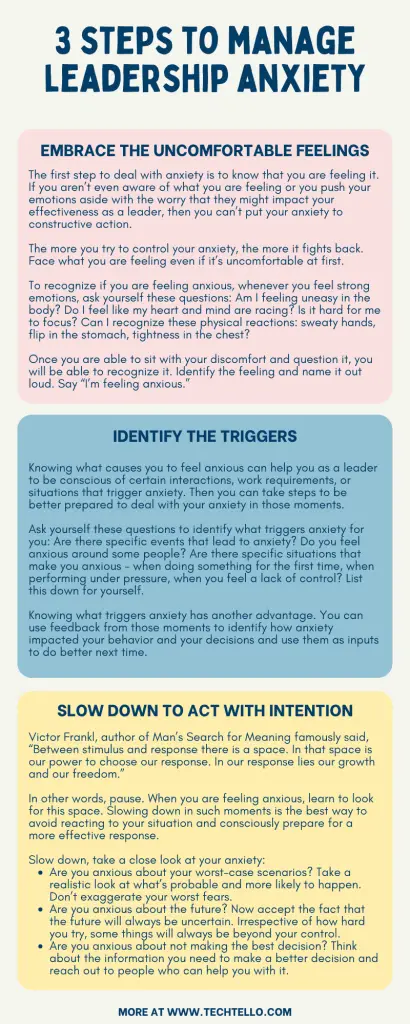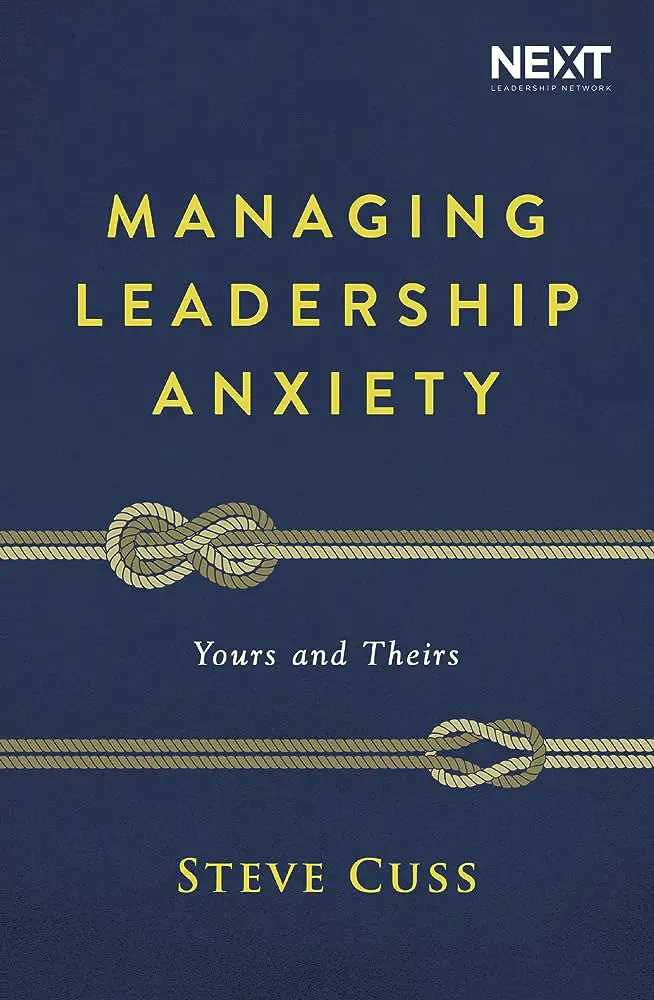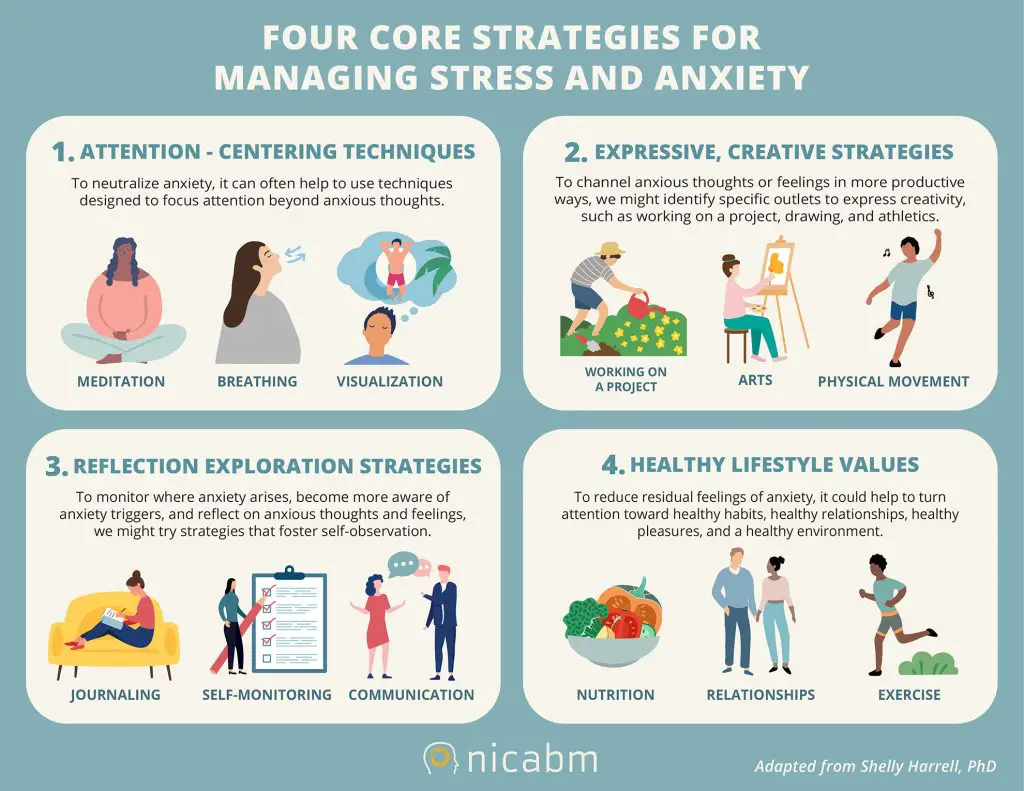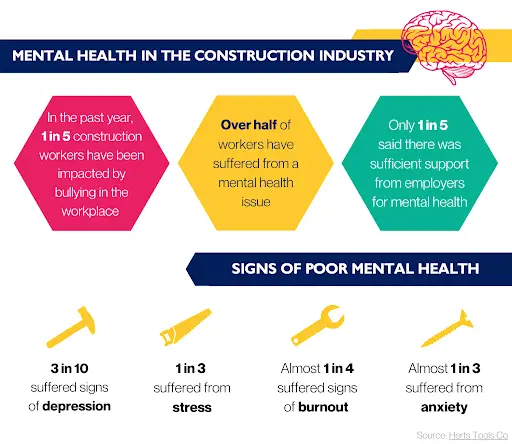In the fast-paced and high-stakes world of senior leadership, managing anxiety becomes a crucial skill for success. With the increasing demands, responsibilities, and pressures that come with this position, it’s essential to find effective strategies to navigate the turbulent waters of anxiety. This groundbreaking product, “Managing Anxiety in Senior Leadership,” offers an innovative approach to help leaders overcome anxiety and cultivate emotional well-being in their professional lives. Whether you’re a seasoned executive or new to the senior leadership role, this product provides invaluable tools and techniques to enhance your performance, improve decision-making, and create a healthier work-life balance. Say goodbye to sleepless nights and hello to a more confident and resilient you with “Managing Anxiety in Senior Leadership.”

This image is property of www.techtello.com.
Understanding Anxiety in Leadership
Defining anxiety
Anxiety is a normal human reaction to stress or a perceived threat. It is characterized by feelings of unease, worry, and fear, often accompanied by physical symptoms such as increased heart rate, sweating, and restlessness. In the context of leadership, anxiety can arise from the pressures and expectations associated with senior positions.
Effects of anxiety on mental and physical health
Anxiety can have detrimental effects on both mental and physical health. Constant worry and stress can lead to fatigue, sleep disturbances, and difficulty concentrating. In the long term, anxiety can contribute to the development of more serious mental health disorders such as depression and substance abuse. It can also manifest in physical symptoms like headaches, gastrointestinal issues, and weakened immune function.
The particular stressors in leadership positions
Leadership positions come with their own unique set of stressors that can contribute to anxiety. The responsibility of making important decisions that impact the success of the organization, managing a team, and dealing with high expectations from stakeholders can create immense pressure. Additionally, leaders may face criticism, scrutiny, and even conflict in the workplace, all of which can further exacerbate anxiety.
Normalizing Anxiety in Senior Leadership
The commonality of anxiety in leadership roles
It is important to recognize that anxiety is not uncommon among leaders. In fact, it is quite common for senior executives to experience anxiety at some point in their careers. Many successful leaders have openly discussed their struggles with anxiety, highlighting the fact that it does not reflect a weakness or lack of competence.
The high-pressure nature of executive positions
Leadership roles are inherently high-pressure positions. The expectations placed on executives to drive results, meet targets, and make critical decisions can be overwhelming. This constant pressure can easily lead to anxiety, even for the most experienced and accomplished leaders.
Recognizing anxiety as a natural human reaction
Anxiety is a natural human reaction to stress and perceived threats. It is important for leaders to understand that experiencing anxiety does not make them inadequate or incapable. By recognizing anxiety as a natural response, leaders can begin to approach it with understanding and compassion.
Dismantling the stigma attached to mental health in the corporate world
Mental health issues, including anxiety, have often been stigmatized in the corporate world. Leaders may feel hesitant to discuss their struggles with anxiety due to fears of being perceived as weak or incapable. To create a more supportive environment, it is crucial to dismantle this stigma and foster open conversations about mental health.
Identifying Anxiety Triggers in Leadership
Common factors contributing to anxiety in leadership
Several factors contribute to anxiety in leadership positions. These may include the fear of failure, imposter syndrome, work overload, conflict within the team or organization, and the pressure to constantly perform at a high level. By identifying these triggers, leaders can begin to address them more effectively.
The impact of high expectations and responsibility
Leaders are often held to high expectations and have a great deal of responsibility resting on their shoulders. The weight of these expectations can significantly contribute to feelings of anxiety. Recognizing and acknowledging these pressures is the first step in managing anxiety effectively.
Pressure to make good decisions quickly
Leaders are often required to make important decisions under tight deadlines and with limited information. This pressure to make good decisions quickly can fuel anxiety as leaders may fear making mistakes or facing negative consequences. Developing strategies to cope with this pressure is crucial for managing anxiety in leadership.
Dealing with criticism and scrutiny
Leaders are not immune to criticism and scrutiny. Whether it comes from superiors, colleagues, or external stakeholders, criticism can evoke feelings of anxiety and self-doubt. Learning how to handle and process criticism in a constructive manner is essential for maintaining mental well-being in leadership roles.
Impact of Anxiety on Leadership Performance
How anxiety affects decision making
Anxiety can have a significant impact on decision-making abilities. When experiencing anxiety, leaders may struggle to think clearly and objectively, leading to hasty or irrational decisions. Anxiety can impair judgment and problem-solving skills, potentially compromising the effectiveness of leadership.
The influence of anxiety on communication skills
Leadership requires effective communication, but anxiety can hinder this essential skill. Anxiety may cause leaders to become less articulate, struggle to convey their message accurately, or avoid difficult conversations altogether. As a result, team dynamics can suffer, and misunderstandings can arise.
Impact on ability to lead and inspire the team
Anxiety can undermine a leader’s ability to inspire and motivate their team. When leaders are overwhelmed by anxiety, they may appear disconnected, indecisive, or lacking confidence. This can erode trust and morale within the team, negatively impacting overall performance.
Decreased productivity and overall performance due to anxiety
Anxiety can take a toll on leadership performance by reducing productivity. When leaders are preoccupied with anxious thoughts or physical symptoms, they may struggle to focus on tasks, meet deadlines, or maintain optimal performance. As a result, both individual and team productivity may suffer.

This image is property of Amazon.com.
Preventing Anxiety in Senior Leadership
Approaches to maintain work-life balance
Maintaining a healthy work-life balance is essential for preventing anxiety in senior leadership roles. Setting boundaries, prioritizing self-care, and allocating time for personal activities can help leaders recharge and find balance amidst their professional responsibilities.
The importance of delegation
Delegation is a key strategy for preventing anxiety in leadership. Leaders should recognize that they cannot do everything themselves and should delegate tasks and responsibilities to capable team members. By empowering others, leaders can reduce their workload and alleviate feelings of overwhelm.
Setting realistic goals and expectations
Setting realistic goals and expectations is crucial for preventing anxiety. Leaders should strive for achievable targets, both for themselves and their team. Unrealistic goals can create unnecessary pressure and contribute to anxiety. By setting attainable goals, leaders can promote a healthier work environment.
Maintaining healthy lifestyle habits
Physical health and mental well-being are interconnected. Leaders should prioritize healthy lifestyle habits such as regular exercise, adequate sleep, and a balanced diet. Engaging in activities that promote relaxation and stress reduction, such as meditation or hobbies, can also support overall well-being.
Techniques for Managing Anxiety in Leadership
Mindfulness techniques and exercises
Mindfulness techniques, such as meditation and deep breathing exercises, can be powerful tools for managing anxiety. Practicing mindfulness helps leaders stay present, reduce stress, and gain perspective. Incorporating daily mindfulness exercises into their routine can greatly enhance a leader’s ability to manage anxiety.
Cognitive behavioral strategies
Cognitive behavioral therapy (CBT) techniques can assist leaders in challenging and reframing anxious thoughts and beliefs. By identifying negative thinking patterns and replacing them with more positive and realistic ones, leaders can effectively manage anxiety. CBT also helps develop coping mechanisms and problem-solving skills.
Role of physical exercise in managing anxiety
Engaging in regular physical exercise offers numerous benefits for managing anxiety. Exercise helps release endorphins, which are natural mood-boosting chemicals. It also acts as a stress reliever, promotes better sleep, and improves overall physical and mental well-being. Leaders should incorporate exercise into their routine to help manage anxiety effectively.
Importance of maintaining a strong support system
A strong support system is crucial for managing anxiety in leadership. Whether it be family, friends, or colleagues, having people who understand and provide a listening ear can make a significant difference. Leaders should not hesitate to lean on their support system during challenging times, as it can offer valuable perspective and emotional support.

This image is property of xquadrant.com.
The Role of Therapy in Managing Anxiety
Professional help for mental health concerns
Sometimes, professional help is necessary to address anxiety in leadership. Seeking therapy can provide leaders with a safe space to explore their feelings, develop coping strategies, and gain a deeper understanding of their anxiety. A mental health professional can offer guidance and support tailored to the unique challenges of leadership positions.
Choosing the right type of therapy
There are various types of therapy available, and it is important for leaders to choose the right one for their needs. cognitive-behavioral therapy (CBT) is often particularly effective in treating anxiety. However, different individuals may respond better to other approaches, such as mindfulness-based therapy or psychodynamic therapy. Consulting with a mental health professional can help determine the most suitable therapy.
Benefit of cognitive-behavioral therapy (CBT) for anxiety
Cognitive-behavioral therapy (CBT) is widely recognized as an effective treatment for anxiety disorders. CBT helps individuals identify and change negative thinking patterns and maladaptive behaviors that contribute to anxiety. Through targeted interventions and techniques, it equips leaders with practical strategies to manage anxiety and improve their well-being.
Role of medication in severe cases of anxiety
In severe cases of anxiety, medication may be considered as part of a comprehensive treatment plan. Antidepressants, anti-anxiety medications, or beta-blockers are commonly prescribed to manage symptoms of anxiety. It is important for leaders to consult with a healthcare professional to discuss the potential benefits and risks of medication in their specific situation.
Creating a Supportive Workplace Culture
Promoting mental health awareness
Promoting mental health awareness is essential in creating a supportive workplace culture. Organizations should prioritize educating employees about mental health, reducing stigma, and fostering a climate where individuals feel comfortable discussing their struggles openly. This can be achieved through training programs, informational materials, and open dialogue.
Building a culture of empathy and understanding
Leaders play a crucial role in building a culture of empathy and understanding within their organizations. By leading by example and demonstrating empathy towards their team members, leaders can help create an environment where mental health is valued and supported. Encouraging open communication and genuine care for one another fosters a culture of understanding.
Establishing mental health support infrastructure in the workplace
Organizations should establish mental health support infrastructure to provide resources and assistance to employees experiencing mental health challenges. This can include access to counseling services, Employee Assistance Programs (EAPs), or mental health hotlines. By providing readily available support, organizations can demonstrate their commitment to employee well-being.
Providing training to identify and help colleagues experiencing mental health issues
Training programs should be implemented to equip employees with the knowledge and skills to identify and support colleagues experiencing mental health issues. This can include training in empathetic listening, recognizing signs of distress, and knowing when and how to refer someone for professional help. Creating a supportive network within the workplace is instrumental in managing anxiety for all employees.

This image is property of www.nicabm.com.
The Role of Coaching and Mentoring in Managing Anxiety
Benefits of having a mentor or coach
Having a mentor or coach can be highly beneficial for leaders managing anxiety. Mentors and coaches provide guidance, support, and an outside perspective on challenges and opportunities. They can offer valuable insights and strategies for managing anxiety, drawing from their own experiences and expertise.
Learning from others’ experiences and strategies
One of the key advantages of having a mentor or coach is the opportunity to learn from their experiences and strategies. Mentors and coaches can share practical tips and approaches they have utilized to manage anxiety or stressful situations. Their knowledge and wisdom can provide leaders with new perspectives and tools for effectively addressing their own anxiety.
Gaining perspective and beneficial advice
Sometimes, leaders may find it challenging to see beyond their own perspective when dealing with anxiety. Mentors and coaches can offer fresh perspectives and alternative solutions to challenges, allowing leaders to gain valuable insights. This broader viewpoint can help leaders find clarity and make more informed decisions.
Establishing reliable professional relationships
Building reliable professional relationships with mentors and coaches can contribute significantly to managing anxiety. These relationships create a safe and supportive space where leaders can openly discuss their concerns, seek guidance, and receive constructive feedback. The trust and rapport developed in these relationships can be instrumental in navigating anxiety in leadership positions.
Case Studies: Successful Strategies in Managing Anxiety in Leadership
Analysis of leaders who have successfully managed anxiety
Examining case studies of leaders who have successfully managed anxiety can provide valuable insights. By studying their experiences, strategies, and coping mechanisms, leaders can gain inspiration and learn from real-world examples. These case studies showcase that anxiety can be effectively managed and do not have to hinder leadership success.
Key strategies and habits they implemented
Successful leaders in managing anxiety often implement specific strategies and habits. This can include mindfulness practices, regular exercise routines, dedicated self-care time, stress management techniques, and seeking support when needed. Adopting and adapting these strategies can help leaders better manage their anxiety and improve their overall well-being.
How they fostered supportive environments in their organizations
Leaders who have effectively managed anxiety often prioritize fostering supportive environments within their organizations. They create cultures that encourage open dialogue, promote mental health awareness, and provide resources for employees. By taking proactive steps to support the well-being of their teams, these leaders create an atmosphere where anxiety can be openly addressed and managed.
Lessons to be learned from their experiences
The experiences of successful leaders in managing anxiety offer valuable lessons for others in similar positions. Leaders can learn the importance of self-care, open communication, and seeking support when needed. They can also learn the significance of acknowledging and addressing anxiety rather than attempting to ignore or suppress it. These lessons can guide leaders in their journey towards effectively managing anxiety in leadership roles.
Understanding and managing anxiety in leadership is essential for both individual well-being and organizational success. By normalizing anxiety, identifying triggers, and implementing strategies to manage it, leaders can navigate the unique challenges of their roles more effectively. With the right support, resources, and resilience, leaders can thrive and lead with confidence while managing anxiety in senior leadership.

This image is property of cdn-biiph.nitrocdn.com.


